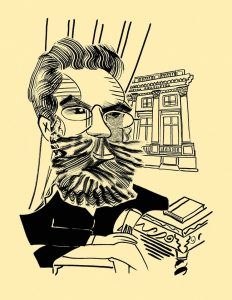 Benjamin Moser in The New Yorker:
Benjamin Moser in The New Yorker:
Joaquim Maria Machado de Assis, Knight of the Imperial Order of the Rose, founder of the Brazilian Academy of Letters, has long been Brazil’s ambassador to the international society of official writers. He seemed to be preparing for the role for most of his adult life, which was so colorless and conventional it might have been taunting future biographers.
An outstanding employee of the Ministry of Agriculture, Commerce, and Public Works, Machado, like Kafka (of the Worker’s Accident Insurance Institute) and Cavafy (of the Third Circle of Irrigation), wore prim suits, lived in nondescript neighborhoods, worked bureaucratic jobs, and rarely stirred from the city where he was born.
These authors looked like emblems of the petit bourgeois, and the gap between their appearance and their writing made them emblems of something else, too—of the inner life pulsing behind the mask that the modern person dons. That gap allowed such writers to take on an electric symbolism. By presenting no outward challenge to their epochs, they could move freely through them—and eventually define them.
Machado “had a half dozen gestures, habits, and pat phrases,” an early biographer, Lúcia Miguel Pereira, wrote, in 1936. He avoided politics. He was an ideal husband. He spent his free time at the bookshop. And, in founding the Academy of Letters, he brought an administrative structure to literature.
Yet to place this image beside his books is to wonder whether such diligence was a carefully calibrated act—and to see why, despite more than a century’s veneration, the vestment of national spokesman will never quite fit. Machado was too ironic, too mischievous, for the pretentions that the official homages imply.
More here.
